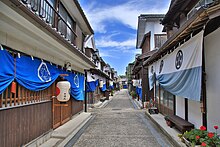Ōsakishimojima
Native name: 大崎下島 Ōsakishimojima | |
|---|---|
 The port of Mitarai | |
| Geography | |
| Location | Seto Inland Sea |
| Coordinates | 34°06′08″N 132°29′41″E / 34.102342°N 132.49474°E |
| Area | 17.82 km2 (6.88 sq mi) |
| Coastline | 26.0 km (16.16 mi) |
| Highest elevation | 449 m (1473 ft) |
| Highest point | Mt. Ippōji (一峰寺山) |
| Administration | |
Japan | |
| Prefecture | Hiroshima |
| City | Kure |
| Demographics | |
| Ethnic groups | Japanese |
Ōsakishimojima (大崎下島) is an island in the Geiyo Islands of the Seto Inland Sea, off the southern coast of Honshu in the prefecture of Hiroshima. The island is best known for the town of Mitarai (御手洗), an important port of call for ships during the Edo era.[1]
Geography[edit]

Ōsakishimojima means "Lower Ōsaki Island". It is located south of Ōsakikamijima (Upper Osaki Island) and southwest of Okamura Island. The island is a leading production site of mandarin oranges in Hiroshima prefecture.[2]
History[edit]

With the development of the Western Circuit (西廻り航路, nishimawari kōro) shipping route through the Seto Inland Sea in the Edo period, the town of Mitarai grew as a port for ships waiting for rising tide or favourable winds. The Wakaebisuya chaya, the largest in the Inland Sea, employed over 100 women,[3] and in The Inland Sea, Donald Richie states that the daimyo of Kumamoto once spent a thousand gold pieces in one night there.[4] The town was also frequented by political figures travelling to and from Osaka and Edo, and the Mitarai Treaty, a secret agreement between the provinces of Chōshū and Geishū to ally against the Tokugawa shogunate, was a key event in the fall of the shogunate.[1]
Today, the town includes gabled houses with sangawarabuki roofs and is dotted with Western style houses. The port area retains its historical character with groynes, stepped piers and a lighthouse, and is gazetted as an Important Preservation District for Groups of Traditional Buildings.[5]
Most of Ōsakishimojima was formerly covered by the town of Yutaka, with a small portion on the west coast in Toyohama. On March 20, 2005, both Yutaka and Toyohama, along with the towns of Ondo, Kurahashi and Kamagari (all from Aki District) and Yasuura (from Toyota District), were merged into the expanded city of Kure.[6]
Transportation[edit]
Ōsakishimojima is linked by the Akinada Tobishima Kaido westwards to Toyoshima Island and onward to the mainland of Honshu near the city of Kure, Hiroshima, as well as eastwards to Okamura Island, the current terminus of the bridges.[7]
Ferry services are also available to Ōsakikamijima. There have been plans since 1972 to replace this with a bridge, or alternatively build one to Ōmishima Island, but none have come to fruition.[8]
References[edit]
- ^ a b "Mitarai: An Edo-period Port Town Unchanged by the Tides of Time" (PDF). Ministry of Land, Infrastructure, Transport and Tourism, Japan.
- ^ "Hiroshima Cultural Encyclopedia - Ocho Mikan Mandarins -". www.hiroshima-bunka.jp.
- ^ "若胡子屋跡/豊地区 - 呉市ホームページ". www.city.kure.lg.jp.
- ^ Richie, D.; Midorikawa, Y. (2015). The Inland Sea. Stone Bridge Press. p. 190. ISBN 978-1-61172-916-0. Retrieved 2024-05-12.
- ^ "List of Important Preservation Districts for Groups of Traditional Buildings | AGENCY FOR CULTURAL AFFAIRS". www.bunka.go.jp.
- ^ "合併要覧(呉市)" (PDF). 日本都市センター.
- ^ "安芸灘諸島連絡架橋 - 広島県". 広島県公式ホームページ.
- ^ "大崎上島町 第2次長期総合計画" (PDF). 大崎上島町ホームページ.

